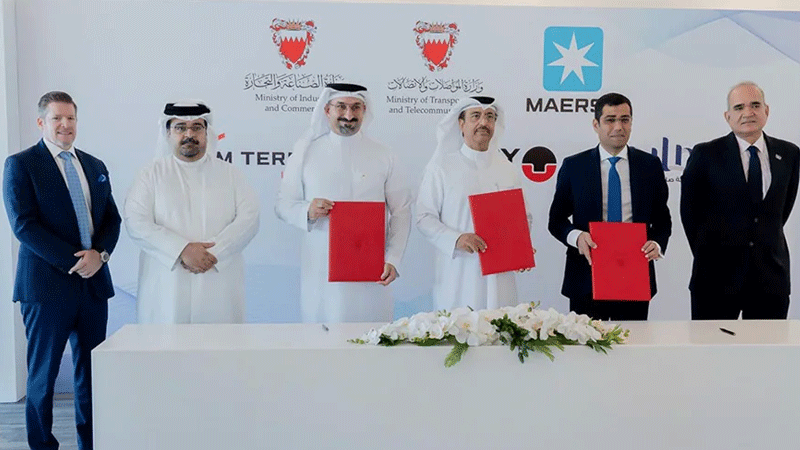A memorandum of understanding (MoU) was signed between the Ministry of Transportation and Telecommunications, the Ministry of Industry and Commerce, and A.P. Moller – Maersk to evaluate and establish a ship recycling initiative in the Kingdom of Bahrain. The signing ceremony was also attended by strategic partners taking part in the project, which included the Arab Shipbuilding and Repair Yard Company (ASRY), SULB Company, and APM Terminals Bahrain, the operator of Khalifa Bin Salman Port and a subsidiary of A.P. Moller – Maersk.
According to the MoU, both the Ministry of Transportation and Telecommunications and the Ministry of Industry and Commerce will provide regulatory support to ASRY, which, in turn, will be responsible for equipping the yard and docks with the necessary requirements for the ship recycling process. A.P. Moller – Maersk, an integrated logistics company, will serve as the technical and operational advisor, providing expertise on implementing sustainable practices and responsible standards in ship recycling. SULB will utilise the steel from the ship recycling process and further process and recycle it for the local and international markets.
The MoU, the first of its kind in the Kingdom of Bahrain, aims to develop a ship recycling and green steel ecosystem in Bahrain by establishing collaboration between the Government and industry stakeholders and ensuring sustainability during the entire process. The MoU also exemplifies successful public-private partnerships in achieving the Sustainable Development Goals (SDGs) and Bahrain’s Economic Vision 2030.
On this occasion, His Excellency the Minister of Transportation and Telecommunications, Mr. Mohammed bin Thamer Al Kaabi, affirmed the Kingdom of Bahrain’s commitment to achieving the Sustainable Development Goals through effective strategic public-private partnerships as well as the Ministry’s commitment to adopting and complying with international best practices and standards in iron and steel recycling. His Excellency further added that this initiative will contribute to economic growth by enhancing commercial activity from the sale of recycled material.
His Excellency the Minister of Industry and Commerce, Mr. Abdulla bin Adel Fakhro, further endorsed the Kingdom of Bahrain’s commitment to embracing sustainable manufacturing and enabling the private sector to adopt circular carbon economy principles, which in turn cultivates environmental and social governance and aligns with the Industrial Sector Strategy (2023-2026).
His Excellency also added that such an initiative serves to achieve carbon neutrality and advance Team Bahrain’s efforts in adopting policies and initiatives that aim to reduce the carbon footprint in the industry sector.
“Maersk has established a ship recycling programme governed by our own Responsible Ship Recycling Standards (RSRS) independent of geography. The standards comprise stringent interpretation of the guidelines laid out by the IMO through the Hong Kong Convention and exceed requirements on several parameters, including downstream waste management, standards on labour and human rights, anti-corruption, etc. We are proud to bring our technical and operational knowledge to the Kingdom of Bahrain and share it with like-minded stakeholders that will help the industry address the capacity challenges we are staring at in the future. We are hopeful that this MoU will provide the right platform to accelerate responsible ship recycling in the Kingdom, create a positive impact on the country’s economy and create jobs.”
Mr Ahmed Hassan, Senior Vice President Head of Asset Strategy, A.P. Moller – Maersk
The MoU signing is a testament to the Ministry of Transportation and Telecommunications’ efforts in developing the maritime sector, strengthening Bahrain’s position as a regional centre for sustainable and responsible ship recycling, catering to the increasing demand for ship recycling and producing green steel through processes that are at par with best environmental practices and standards. Bahrain is strengthening its position to address the anticipated rapid increase in demand by 2028 through this collaboration. Maersk brings invaluable expertise with a track record of recycling as many as 22 vessels globally over the last eight years without a single incident or loss of time due to incidents.
It is worth noting that the shipping industry accounts for 3% of all global greenhouse emissions. Adopting safe and sustainable ship recycling practices will contribute to combatting climate change in line with the International Maritime Organization’s strategy to reduce emissions from international shipping.









